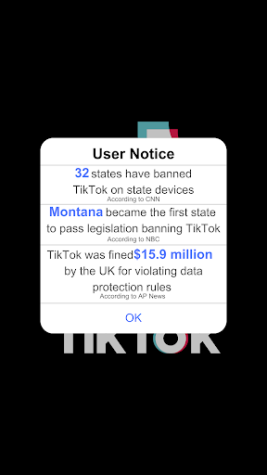TikTok, the clock is running out: Social media app poses potential safety risks
May 9, 2023

Nearly two and a half years ago the previous presidential administration threatened to ban TikTok in the United States if it did not break away from its Chinese owners. Now, a bipartisan group of senators has introduced a bill to ban TikTok. Senators have expressed concerns that the app could be infiltrated by the Chinese government to spy on American users or gain access to U.S. user data. However, researchers who have looked into the possible foreign threats TikTok poses, emphasize that the app is not much different from other social networks in terms of the data it collects or how it communicates with company servers. While there is no direct evidence of Chinese interference, there are still some government officials with reservations over TikTok’s connection to the Chinese government.
Although the security of its users is currently up for debate, math co-department chair Eric Vanston points out that other social media platforms also engage with similar practices, and he suggests creating greater privacy protection across all platforms. While not in favor of an outright ban on TikTok, Vanston believes social media as a whole needs to be looked at critically.
“I do see a need for stronger regulations on technology and social media,” Vanston said. “While [social media platforms] bring some positives to our society, I think they also have many negative characteristics.”
The U.S. government has planned to ban the app because of its possible spying and private data collection. However, Michigan State University Juris Doctor candidate Elizabeth Pentikis believes that TikTok does not collect any different forms of information, compared to other social media platforms.
“I think a lot of the controversy around TikTok comes from the fact that it is owned by a foreign company, not that it is collecting data that is different or more dangerous than other social media sites,” Pentikis said.
Despite the debates over the dangers TikTok possibly holds, users still keep scrolling through the app. TikTok is a place where people have the freedom to express themselves openly, according to sophomore Cara Kaslatas who believes this app contributes to a feeling of community and appreciates the gratification it brings.
“I think a lot of people would be upset [if TikTok was banned],” Kaslatas said. “Having something you can go home to, knowing it is there to help you unwind and distress from the day gives a sense of comfort.”
Moreover, TikTok has been criticized for promoting harmful cultural trends and behaviors, yet Pentikis points out that the app has the potential to have a positive impact on the community, but believes its current capacity is more negative.
“Social media sites have the ability to evolve into really current and fast breaking news sources as users can share an event they are experiencing or their points of views instantly,” Pentikis said. “However, TikTok is still a little too commercial with the heavy influencer use and advertising model. It is almost too commercial to be beneficial.”
The growing number of bans on the popular app have led many to question the security of TikTok. While one could point to TikTok’s possible Chinese influence as cause for concern, others believe the lack of privacy protection on social media is a bigger and more pressing matter. The repercussions of future bans are still unknown, but the possibility of a federal ban has led to relevant debates about privacy and the influence of foreign countries on social media.
“I think social media sites should be more transparent about what data they collect so users can make their own informed decisions about [whether] they feel comfortable sharing it,” Pentikis said.











